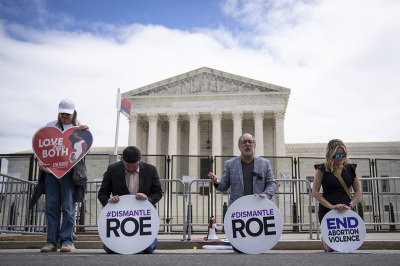Stare Decisis or stare de-crisis?

The unprecedented revelation of the draft of a majority opinion by Justice Samuel Alito in Dobbs v. Jackson Women’s Health Organization likely signals a repudiation of the Court’s opinion in Roe v. Wade (1973). For close to 50 years, Roe has provided relatively broad nationwide protections for women and their doctors to abort unwanted or dangerous pregnancies.
Although most commentators have argued for or against the decision on policy grounds or on the basis of perceived public opinion, a popular argument against Alito’s opinion is that it overturns precedent, or what lawyers and scholars call stare decisis. This criticism is particularly relevant to this case because some sitting justices who appear ready to side with Alito have previously expressed support for this doctrine specifically in reference to the decision in Roe v. Wade during their Senate confirmation hearings. Moreover, the Court supported the application of this doctrine to abortion in Planned Parenthood of Southeastern Pennsylvania v. Casey (1992).
As that opinion declared, the law provides stability. The longer the law is in place, the greater the presumption for its continuance should be, especially in a decision like Roe, in which the Court was unified (it was a 7-2 decision), and in which it meticulously explained its reasoning. In Planned Parenthood, Justices Sandra Day O’Connor, Anthony Kennedy, and David Souter further argued that the decision had proven to be workable, that it had created a strong “reliance interest” among women who planned their lives knowing they would control the decision to keep or terminate a pregnancy for themselves, and that reversing decisions could undermine the legitimacy of the court.
Despite the strength of such arguments, there are also weaknesses, which Justice Alito has identified. The most obvious is that the U.S. Constitution does not directly address the subject of abortion, and the Court’s reasoning in Roe owed more to medical textbooks than to constitutional text. Alito points out that some of the most ardent defenders of the right to choose acknowledged the weak reasoning by which the Court supported it. In arguments that most commentators appear to have ignored, Alito contends that the Court’s argument in Roe that abortion went unregulated when the 14th Amendment was adopted in 1868 was simply mistaken. If Alito is correct and Roe was built on faulty historical analysis, then it is even shakier.
It is difficult to argue categorically either for legal instability or for stare decisis. Had stare decisis prevailed in 1943, we might still require public school students to participate in compulsory flag salutes. Had stare decisis prevailed in 1954, we might still have Jim Crow segregation. Had stare decisis prevailed in 1973, the Court would likely have left abortion where it now seeks to place it with the states.
The fact that the country is arguably more divided on the morality of abortion and on the wisdom of abortion legislation than when Roe was decided in 1973 suggests that the issues will continue to evoke passion and erode governmental legitimacy whether Roe stands or falls. Many states permitted abortions prior to Roe, and many will likely continue to do so even if Roe is overturned.
Those who argued for Roe v. Wade asked the Court to intervene in an area that it had previously left to state determination. If Alito’s opinion becomes law of the land, current pro-choice advocates of stare decisis will likely urge the Court to right a wrong and return to Roe.
Historically, failing to adhere to stare decisis sometimes remedies a crisis and sometimes exacerbates one. When the Supreme Court issued its decision in the Dred Scott Case in 1857, Abraham Lincoln said that the ultimate decision over slavery remained with the people. They ultimately reversed the decision through the adoption of the 13th and 14th Amendments.
At present, it appears that we will lurch forward without a sufficient consensus to adopt a constitutional amendment or national legislation on the subject and that the Court will abandon Roe and return the issue of abortion to the states for their individual resolution.
John R. Vile is a Professor of Political Science and Dean of the University Honors College at Middle Tennessee State University and the author of Essential Supreme Court Decisions, which is in its 18th edition.



























